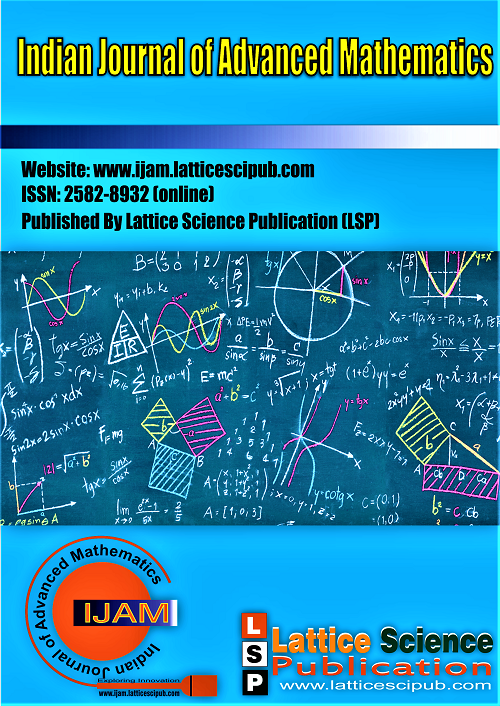Complex Dynamics of an Aquatic Tri-Trophic Food Chain System with Holling Type IV Functional Response
Main Article Content
Abstract
Complex dynamics of a modified Hastings-Powell (HP) model (phytoplankton-zooplankton-fish) with Holling type IV functional response are investigated in this article. Boundedness of the system has been established. A detailed study of the boundary equilibrium points and their local stability has been carried out. The condition of uniform persistence of the system has also been derived. Dynamical complexities and subsequent changes in the states of the system have been portrayed using numerical simulation. Modified HP model with Holling type IV functional response gives rise to a similar type of chaotic dynamics (inverted 'teacup attractor’) as observed in the original HP model with Holling type II functional response. Chaotic or stable dynamics are also numerically verified using Sil'nikov eigenvalue analysis.
Downloads
Article Details

This work is licensed under a Creative Commons Attribution-NonCommercial-NoDerivatives 4.0 International License.
How to Cite
References
Hastings, A., Powell, T. (1991). Chaos in a Three-Species Food Chain. In Ecology (Vol 72, Issue 3, pp 896-903).
DOI: https://doi.org/10.2307/1940591/ works, works remain significant, see declaration
Stollenwerk, N. Aguiar, M. Kooi, B.W.(2022). Modelling Holling type II Functional Response in Deterministic and Stochastic Food Chain Models with Mass Conversion. In Ecological Complexity (Vol 49, March 2022, 100982). DOI: https://doi.org/10.101/j.ecocom.2022.100982
Myint, A. Z. Wang, M.(2022). Dynamics of Holling Type II Prey Predator System with A Protection Zone For Prey. In Applicable Analysis (Vol 101, Issue 6, pp 1833-1847). DOI: https://doi.org/10.1080/00036811.2020.1789595
Freedman, H.I. Waltman, P. (1984). Persistence in models of three interacting predator-prey populations. In Mathematical Biosciences (Vol 68, Issue 2, pp 213-231). DOI: https://doi.org/10.1016/0025-5564(84)90032-4, works remain significant, see declaration
Francis, O. Aminer, T. Okelo, B. Manyala, J. (2024). Dynamical Analysis of Prey Refuge Effects on the Stability of Holling Type III Four-Species Predator-Prey System. In Results in Control and Optimization (Vol 14, March 2024, 100390). DOI: https://doi.org/10.1016/j.rico.2024.100390
Andrews, J. F. (1968). A mathematical model for the continuous culture of microorganisms utilising inhibitory substrates. In Biotechnology and Bioengineering (Vol 10, Issue 6, pp 707-723). DOI: https://doi.org/10.1002/bit.260100602. 260100602, works remain significant, see declaration
Sarwardi, S. Hossain, S. Basir, F. A. Ray, S.(2023). Mathematical Analysis of an Ecological System using a Non-monotonic Functional Response: Effects of Gestation Delay and Predator Harvesting. In International Journal of Dynamics and Control (Vol 11, pp 605-618).
DOI: https://doi.org/10.1007/s40435-022-00999-1
Ghosh, U., Sarkar, S, Mondal, B. (2021). Study of Stability and Bifurcation of Three-Species Food Chain Model with Non-monotone Functional Response. In International Journal of Applied and Computational Mathematics (Vol. 7, Article No. 63).
DOI: https://doi.org/10.1007/s40819-021-01017-2
Sokol, W., Howell, J. A. (1981). Kinetics of Phenol Oxidation by Washed Cell. In Biotechnology and Bioengineering (Vol 23, Issue 9, pp 2039-2049). DOI: https://doi.org/10.1002/bit.260230909. 260230909, works remain significant, see declaration
Castillo-Alvino, H.H. Marva, M (2022). Group Defence Promotes Coexistence in Interference Competition: The Holling type IV competitive Response. In Mathematics and Computer in Simulation (Vol 198, pp 426-445). DOI: https://doi.org/10.1016/j.matcom.2022.02.031
Taipale, S. J., Kuoppamaki, K, Strandberg, Peltomaa, E, Vuorio, K (2020) Lake Restoration Influences Nutritional Quality of Algae and Consequently Daphnia Biomass. In Hydrobiologia (Vol 847, pp 4539-4557). DOI: https://doi.org/10.1007/s10750-020-04398-5
Liu, X., Huang, Q. (2020). Analysis of Optimal Harvesting of a Predator-Prey Model with Holling IV Functional Response. In Ecological Complexity (Vol 82, March 2020, 100816). DOI: https://doi.org/10.1016/j.ecocom.2020.100816
Chai, C., Shao, Y., Wang, Y. (2023). Analysis of a Holling Type IV Stochastic Prey predator System with Anti-Predatory Behavior and Levy Noise. In AIMS Mathematics (Vol 8, Issue 9, pp 21033-21054). DOI: https://doi.org/10.3934/math/math. 20231071
Alessandro, A. Chanaka, K. Chunhua, S (2022) A Predator Prey System with Generalized Holling type IV Functional Response and Allee Effects in Prey. In Journal of Differential Equations (Vol 309, pp 704-740). DOI: https://doi.org/10.1016/j.jde.2021.11.041
Birkhoff, G. Rota, G. C. (2016). Ordinary Differential Equations, Wiley India Private Limited, New Delhi. 4th Edition. ISBN-9788126562107 (Pbk)
Kumar, R. Freedman, H. I. (1989) A Mathematical model of fluctuative mutualism with populations interacting in a food chain. In Mathematical Biosciences (Vol 97, Issue 2, pp 235-261). DOI: https://doi.org/10.1016/0025-5564(89)90006-0, works remain significant, see declaration
Butler, G. J. Waltman, P. Freedman, H. I (1986) Uniformly persistent systems. In Proceedings of the American Mathematical Society ( Vol. 96, pp 425-430). DOI: https://doi.org/10.1090/S0002-9939-1986-0822433-4, works remain significant, see declaration
Zhou, L. Chen, F. (2008). Sil'nikov chaos of the Liu system. In Chaos, (Vol 18, March 10, 013113). DOI: https://doi.org/10.1063/1.2839909, works remain significant, see declaration
Ding, Y. Zheng, L. (2023) Existence of homoclinic orbit of Shilnikov type and the Application in Rossler System. In Mathematics and Computers in Simulation (Vol 206, April 2023, pp 770-779). DOI: https://doi.org/10.1016/j.matcom.2022.12.013





